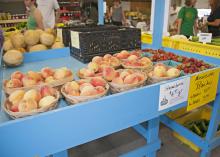Information Possibly Outdated
The information presented on this page was originally released on July 22, 2016. It may not be outdated, but please search our site for more current information. If you plan to quote or reference this information in a publication, please check with the Extension specialist or author before proceeding.
Produce preferences help state truck crop market
STARKVILLE, Miss. -- Favorable weather and a steady consumer appetite for local produce are keeping Mississippi’s truck crop industry strong.
The state now has more than 80 farmers markets, compared to 52 in 2010. These markets make up the main avenue through which truck crop growers sell their goods, but local produce can be found with more frequency on grocery store shelves during the growing season. This trend reflects the shift in consumer preference.
Jeff Wilson, a regional horticulture specialist at the Mississippi State University North Mississippi Research and Extension Center in Verona, said current concerns among growers are excessive heat and dry weather. All signs now point to a successful season due to good growing conditions in the spring.
“I go to multiple farmers markets a week, and the vendors and growers I’ve spoken to have reported high yields with both fruits and vegetables,” he said. “Conditions are hot and dry now, but that is to be expected. Spring was cool and wet, which is also normal. We saw some disease pressures in spring, but those mostly went away when temperatures increased.”
The MSU Division of Agriculture, Forestry and Veterinary Medicine categorizes fruits and vegetables, along with other produce found at farmers markets, as horticultural crops. Value of production estimates for that commodity totaled $112 million in 2015 and $114 the year before. This value accounts for about 2 percent of the state’s agricultural economy.
Most truck crops in Mississippi are grown during the spring and summer because many fruits and vegetables grow best in warmer weather. As farmers markets open in new places, more growers are entering the truck crops market for the first time to gain supplementary income. However, high up-front costs and intensive labor are roadblocks for some producers who might otherwise be interested in entering the business.
Extension fruit specialist Eric Stafne said there is still room for more potential growers to enter the market, depending on what they want to produce.
“Interest in sustainable and organic production is still trending up,” he said. “Newcomers to truck crop growing can succeed if they grow crops that have not saturated the market. We have a lot of people growing blueberries right now, but there is room for growers of niche produce. We’d like to see more organic farmers. Crops such as blackberries and tree fruits could be grown more than they are.”
Weather timing dictates the quality and quantity of fruit crop yield.
“Rain can be good or bad, depending on when it falls,” Stafne said. “Rain during tree fruit bloom harms the crop because pollination is inhibited. Last winter was very mild, so some areas didn’t receive enough chilling hours required to break bud. We saw erratic bloom in places because a certain amount of time with cold temperatures is required.”
MSU supports truck crops agriculture statewide with research plots at the North Mississippi Research and Extension Center in Verona, the Horticulture Unit in Beaumont and the Truck Crops Branch Experiment Station near Crystal Springs.
The Mississippi Department of Agriculture has a list of state farmers markets posted at https://www.mdac.ms.gov/bureaus-departments/farmers-market/markets-mississippi/.








